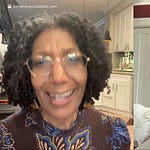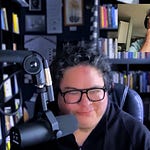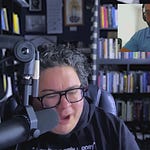Dear Substack Community: Leaving the road life and settling down as a pastor has been one of the best things I’ve done for myself. I have just returned from Nashville, TN, my first time back since we fled in 2023. I didn’t announce my arrival and I committed to the reason why I was there, which was to invest in myself and the work of Narrative Intelligence with Istoria.
I took one picture while I was away, and actually it was taken by someone else on the sidewalk of me and one of my best friends, Rachel. I had 3 hours on Friday night to socialize, so I carefully texted a handful of people and let them know I was in town. I sat down at the Urban Cowboy with folks who are helping me in this world: Dr. J. Kyle Gregory of Nexus, Derek Webb, Lee, and some scholars. We didn’t have much time, but we had just enough time to touch in and take another step together toward another possible world. Everyone at the table at the Urban Cowboy has been making their life at the edges of institutions. These people have become my family, my community of radical difference.
The only other picture I took was with a new friend, a kindred spirit, who was also attending the Poetics Forum with me! In fact, Kirsten Bombdiggity is the reason I’m leaning into AI and Narrative Intelligence. She keeps inviting me into the work. We connected on one of our calls; she saw me clearly one day and I felt invited in! Kirsten gave me a feelings wheel as soon as she arrived at our table we were sharing! I’m discovering that I am angry and she told me that anger shares a relationship with sadness. I’ve always had a hard time naming my feelings. I know I have feelings, but I don’t have the language to describe them. My interior life has faded into the shadows of me becoming an academic, and now I have the tools to start articulating my feelings in more sustainable ways. Kirsten and I took a selfie at the White Limozeen, and I want you to know the amazing people I am meeting through investing in Applied Narrative Intelligence. Kirsten is in my life for a particular reason and I think it is to help me learn how to play. Nikki Young asked me what I do for fun and how do I play when she came to my PhD graduation, and I did not have an answer for her. I am starting the journey of learning how to play, again, as an adult.
Part of the work I’m doing is learning to unravel from the toxicities of my socialization and conditioning as an academic. And, I’m learning how to compost my anger by learning how to have a relationship with my anger. That means I have to repair my relationship to myself and the ways I’ve been socialized by violence and have been violent myself in a variety of ways. I am stepping into another fold of my becoming and learning to unravel from the narratives that no longer serve me. I’ll be writing on this as I explore belonging and freedom in my next book, which I was able to map out a bit at the event in Nashville with Kirsten next to me working on her project!
Here’s the sermon I preached today in text; audio is up above. I’m posting an image that Erin took of the beautiful altar this morning. I spoke on the importance of beauty, and this image captures a fold of beauty in the hyper colonized site of empire that is rural America. Truth, Beauty, and Goodness will save us in moments of despair.
🌿 Sermon Title: “Hosanna in the Empire”
I have stepped into this pulpit with this particular microphone after being handed microphones in various protests and organizing meetings. We can learn a lot from protest culture and pushing against the status-quo, or systems of extraction that accelerate folds of empire, and there are many ways to protest.
We are gathered here today as a practice of gathering and nurturing our relationships with each other and with the what lies beyond our material reality. Some might say, coming inside this historic building is a protest to the rest of the world who does not see the benefit of this particular practice.
Protest comes in a variety of ways, and we see in the stories of Jesus a life of protesting institutions and then protesting religious elites and economic systems and exploitations. The life of Jesus in these tells different stories. And, one of the stories that is part of the drama of the life of Jesus is today, Palm Sunday.
It was a protest. It was not modeling the hegemony of the day.
There is something holy in a crowd with raised voices.
In the ancient city of Jerusalem, the streets filled with a ragtag assembly—peasants, workers, the sick, the curious—waving palms and shouting one word:
Hosanna.
We hear it now and think it means “praise.” But at its root, Hosanna means something closer to “Save us, we beg you.”
It is a cry for help disguised as a hymn.
It is the voice of the people who have seen too much violence, too much hunger, too much empire.
And they are crying out—not with despair, but with hope.
With the dangerous belief that something else is possible.
⸻
Jesus doesn’t ride in on a war horse.
He enters not like Caesar, but like wisdom herself:
low to the ground, gentle, defiant.
He rides a donkey.
A beast of burden. A symbol of humility.
A sign to anyone paying attention:
“I am not here to conquer by the sword.
I am here to disrupt by love.”
⸻
🌀 Hosanna in the Age of Empire
We know empire.
Not just Rome. Not just then.
We know the American empire with its drones and pipelines,
its gilded towers and rusted-out towns,
its profit-driven medicine and gun-filled prayers.
We know the empire that teaches us to compete instead of care,
to accumulate instead of share,
to numb instead of feel.
And we know the people still crying Hosanna:
• Save us from the violence of white supremacy.
• Save us from climate collapse.
• Save us from political games played with our lives.
• Save us from despair disguised as normal.
⸻
💠 The Wisdom Economy of Christ
Jesus doesn’t ignore the cries.
But he also doesn’t save us through domination.
He lives out a different economy entirely.
What we might call the wisdom economy—
a way of being rooted in:
• embodied care,
• collective dignity,
• reciprocal love.
He teaches that salvation doesn’t come from winning.
It comes from turning toward one another,
from living as if every person matters
because in the reign of God, they do.
The character of Jesus is not just to heal,
but to refuse to play by empire’s terms.
⸻
So what do we do with Hosanna today?
We say it. We sing it. We cry it.
We raise it not as passive observers,
but as people ready to follow Christ on this strange, subversive road.
Hosanna is not a soft song.
It is the sound of protest and praise joined together.
It is the mother in Gaza.
The trans kid in Tennessee.
The minimum-wage worker.
The climate striker.
The hospice chaplain.
The teacher.
The truth-teller.
It is us.
Still crying out:
Save us—not by power, but by wisdom.
Not by might, but by mercy.
Not through empire, but through love.
⸻
🙌 A Call to the Church
So church: raise your palms like protest signs.
Wave them for a future you can’t fully see but still believe in.
Shout Hosanna as your pledge to walk in the way of Christ—
not just this Sunday, but in every hard, beautiful week ahead.
Refuse despair.
Practice courage.
Follow the donkey-riding Savior
into the places empire wants us to forget.
For this is the Gospel:
God has entered the streets.
And salvation is riding in on borrowed hope.
May it Be So.















